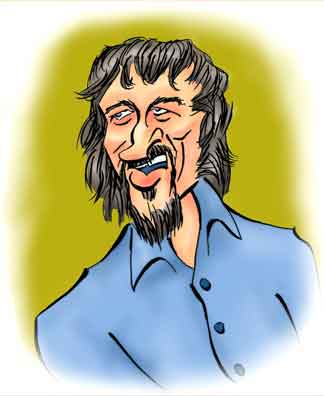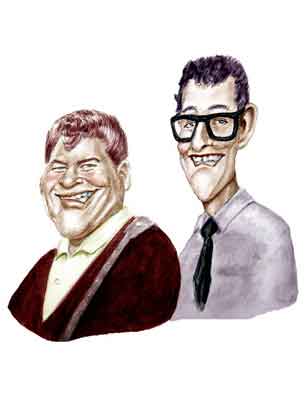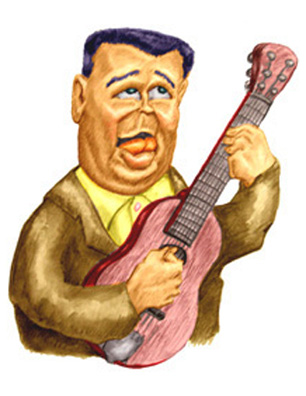Waylon Jennings
A Founding Outlaw

Waylon Jennings was a founding member of the "outlaw" class of country and western singers. These were the C&W (often called H&G) celebrities who foreswore the polished fancy duds and smooth treacly sound of the country singers who popped up during the 1930's and 40's.
Instead the outlaws let their hair grow long and shaggy and they made partyin' out of lovin'. And as they didn't live in Muskogee, many were known to ...
Well, let's just say outlaw singers didn't always follow the norms and customs of Middle America. But even when sticking with acceptable behavior they did so with a gusto that wasn't always healthy. Waylon himself was a six-pack man. That's not a beverage we're talking about. It was six packs of cigarettes and per diem that Waylon wolfed down.

Ritchie and Buddy
Also on the Tour
Now although it's not known so much to the Great Public, all true fans of Waylon are aware he was present at a pivotal moment in rock and roll history. On February 2, 1959, Waylon played bass for Buddy Holly at the Surf Ballroom in Clear Lake, Iowa. This was a stop on the famous multi-star "Winter Dance Party Tour" which featured not only Buddy and his band (called "The Crickets"), and also headlined Ritchie Valens (of "La Bamba" fame), Dion DiMucci (who nearly a decade later would release the popular "Abraham, Martin, and John"), and Jiles Perry Richardson. Jiles, known as J. P. to his friends and "The Big Bopper" to his fans, was a disc jockey from Beaumont, Texas, who had just had an unexpected hit with the novelty song "Chantilly Lace".

Jiles Perry Richardson
The Big Bopper
The tour had arrived in Iowa on an old bus and in the depths of a frigid Iowa winter (actually few Iowa winters are balmy). The heater on the bus had given out and just before reaching the city limits the bus had broken down. Everyone had to catch rides into town, and Buddy's drummer, Carl Bunch, had to leave the tour because of frostbitten feet.
Buddy had decided to make the next leg of the tour to Moorehead, Minnesota, on a small chartered airplane. Also going along were Waylon and Buddy's guitarist Tommy Allsup.
The Big Bopper though had come down with a cold. So Waylon volunteered to let the Bopper to take his spot on the plane. Ritchie wanted to take the plane, too, and pestered Tommy to let him take his place.
At first Tommy demurred but Ritchie was so persistent that Tommy said he'd flip a coin for it. The coin went up and Ritchie called heads.
Heads it was. "Well," Tommy said, "this must be your lucky day.
Shortly after midnight on February 3, 1959, the ownder of the air service, Jerry Dwyer, drove Buddy, Ritchie, and the Bopper to the near-by Mason City airport. They stowed their luggage on the plane. Then with the 21-year-old commercial pilot Roger Peterson at the controls, they taxied to the runway. After a pause of a few minutes (a delay still not explained), they took off for Moorhead, Minnesota.
The plane never arrived. The next morning the owner of the flight service, Jerry Dwyer, not having heard from Roger, took off in a plane and began to search along the flight path. Soon he spotted the wreckage in a field a few miles from the airport. All three passengers had been thrown from the plane. Roger was still in the wreckage. Of course, all four were dead. (Note: The non-squeamish can read the official coroner's reports if they click here. You can also read the full report of the Civil Aeronautics Board if you click here.)
Waylon always remembered his last conversation with Buddy. Buddy was sitting and eating a hot dog when Waylon walked by.
"So you're not going with us tonight on the plane, huh?" Buddy laughed, "Well, I hope your ol' bus freezes up."
"Well," Waylon replied, giving Buddy some of his own, "I hope your old plane crashes."
Waylon said that bothered him for a long time.
References
The Day the Music Died: The Last Tour of Buddy Holly, Rictchie Valens, and the Big Bopper, Larry Lehmer, Schrimer Books, Simon and Schuster, 1997.
"Buddy Holly: The Tour from Hell", Pamela Huey, Minneapolis Star Tribune, February 3, 2009.
"The Night the Music Died", Michael Hall, Texas Monthly, February 2009.
Waylon told the story about his last conversation with Buddy at various times, including during an interview in 1999 on Country Music Television. Similarly Tommy Allsup has related the story of the coin toss with Ritchie a number of times.